Axe A-levels for Bacc-style exam, say UK scientists
- Published
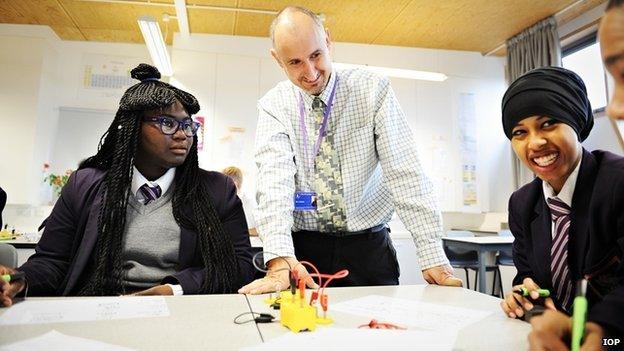
Too few students are taking sciences and maths after the age of 16, says a Royal Society report
A-levels should be replaced by a baccalaureate-style qualification that requires teenagers to study maths and science to 18, scientists say.
A Royal Society report says too few 16-year-olds take maths and sciences to maintain a competitive economy.
The UK's national academy of science warns that UK education risks not being fit for purpose in 20 years' time.
Its report - Vision for Mathematics and Science - also calls for teachers' professional status to be boosted.
"Too many people in the UK are mathematically and scientifically illiterate," said Prof Sir Martin Taylor, chairman of the report committee.
"Science and mathematics are at the absolute heart of modern life.
"Our vision aims to raise the general level of mathematical and scientific knowledge and confidence in the population."
Respected teachers
The authors say science and maths form the foundations of the UK's future economic prosperity and cite research from the Royal Academy of Engineering from 2012 which estimated that more than a million new science, engineering and technology professionals would be needed by 2020.
The report finds excellent practice in science and maths in primary schools across the UK and "offers a way to build on these foundations" as students progress through school.
It suggests:
current exams should be replaced by a baccalaureate-style system, with all students taking maths and science to the age of 18
students specialising in arts and humanities should be kept engaged in science and technology by "rigorous" new courses
the status of teaching should be raised, with teachers expected to develop subject expertise throughout their careers
Teaching should be "a highly regarded career with a high professional status", say the authors, and all teachers should have a teaching qualification or be working towards one.
Ultimately teachers would be trained, trusted and respected to assess public qualifications, rather than relying on external exams.
'Turmoil'
In England and Wales, new independent expert bodies should decide curriculum and assessment standards, with more support for bodies in Northern Ireland and Scotland which already do this.
This would "bring to an end the turmoil that teachers currently suffer as a result of constant changes" and allow them to be more innovative.
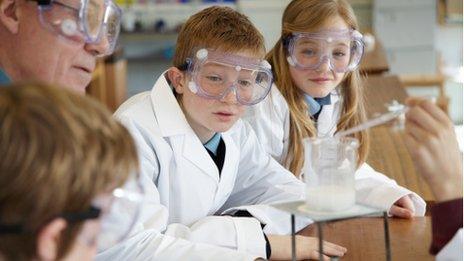
The report calls for a higher status for teachers
The report calls for learned bodies such as the Institute of Mathematics, the Institute of Physics, the Royal Society of Chemistry and the Society of Biology to support and shape what is taught and how it is assessed, and to provide professional recognition and development for specialist teachers.
All primary schools should have access to at least one subject teacher in both science and mathematics. At secondary level, maths and sciences should be taught by teachers with relevant degrees.
The report calls for better careers guidance in schools on jobs in science and technology.
Report co-author Dame Alison Peacock, head of the Wroxham School in Hertfordshire, said: "Teaching is a chronically undervalued profession in the UK.
"Our country's future prosperity rests in teachers' ability to inspire and guide our young people, yet we don't currently adequately recognise or reward them."
'TechBacc'
A spokesman for the Department for Education said the number of young people studying physics and maths had already risen at both GCSE and A-level and reforms to the qualifications system would lead to thousands more young people studying courses in maths, sciences and vocational education.
"Young people will achieve our new TechBacc if they get a set of high-quality post-16 qualifications made up of a Tech Level, a gold-standard vocational qualification endorsed by employers, an advanced maths course and the extended project," said the spokesman.
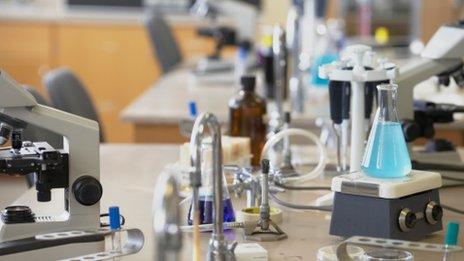
All students should take maths and science to the age of 18, the report says
"University academics and subject experts are making A-levels in sciences and maths far more demanding so young people are prepared for rigorous degree courses."
The government has raised the level of bursaries and scholarships available to the "brightest maths and science graduates", he added.
'Exciting'
Shaun Reason, chief executive of the Association for Science Education, said his organisation was committed to playing its part in raising the level of scientific and mathematical skills and knowledge of the UK population.
"As the professional association for all those involved in science education from pre-school to higher education, we are particularly interested in the professional journey of teachers," he said.
"We agree that the focus on raising the professional status of our current teaching force is critical, so that science teaching is seen as a highly regarded and rewarding career."
Malcolm Trobe, deputy general secretary of the Association of School and College Leaders, said: "The UK is a world leader in science and engineering and we need to have an education system that ensures we stay at the leading edge of developments in these areas.
"It is exciting to have such an august and respected body engaging in the education debate and setting out a long-term vision.
"Teachers will fully support the view that curricula and their assessment should be stabilised and support excellent teaching and learning. There are major changes occurring over the next five years and a period of stability will be important to ensure the changes are successfully embedded."
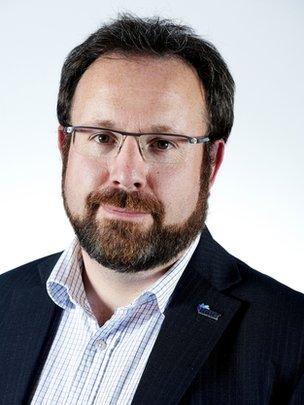
Russell Hobby welcomed the report findings
'Practice and craft'
Russell Hobby, general secretary of the National Association of Head Teachers, said: "As educators we welcome any suggestions to improve the teaching of maths, technology and science, and we find much that is sensible in this report, not least the long-term vision for change.
"We agree that you have to teach and assess the whole of the subject, not just those bits which are easy to measure in a written exam. Because the government does not trust teachers, it risks narrowing the curriculum and diminishing the practice and craft of these subjects.
"The report rightly recognises the importance of highly skilled and motivated teachers. It is only by training and by raising morale that we can equip people to teach these subjects in depth and with a pleasure that brings difficult topics alive. A stable teaching environment will be a key part in restoring the confidence of the profession.
'Destructive cycle'
"It is also becoming increasingly clear that we do need to think more about the role of subject specialisms at primary school - and how this can be combined with the huge pastoral role that primary teachers play.
"We agree that we need to help children see the connections between what they learn at school and what they may be doing with the rest of their lives - particularly at work. By the age of 14, students and their families are making choices which open and close doors. Careers guidance - in a light-touch format - should begin early.
"Encouragingly, this is a good example of civil society lifting education policy out of the hands of politicians and showing that we are all responsible for education. We see this more and more, and it may just break the destructive cycle of short-term fashions and adversarial relations that holds our schools back."
- Published9 April 2014
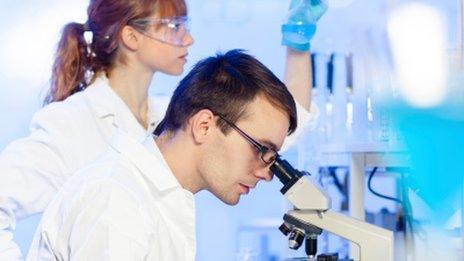
- Published9 September 2013
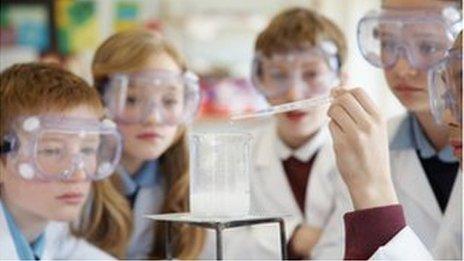
- Published28 August 2013
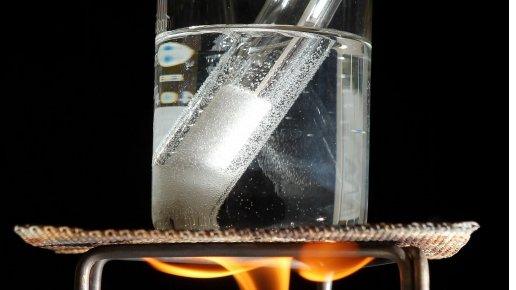
- Published16 May 2013
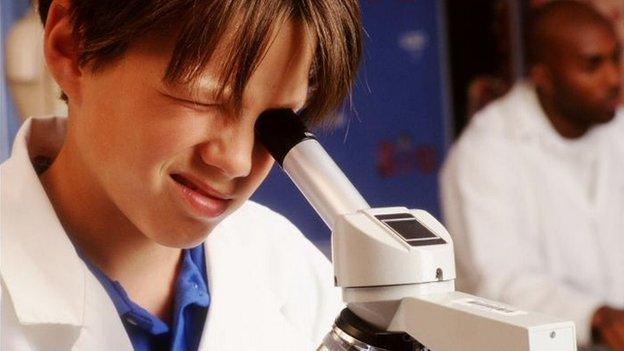
- Published11 January 2013
.jpg)
- Published15 February 2011